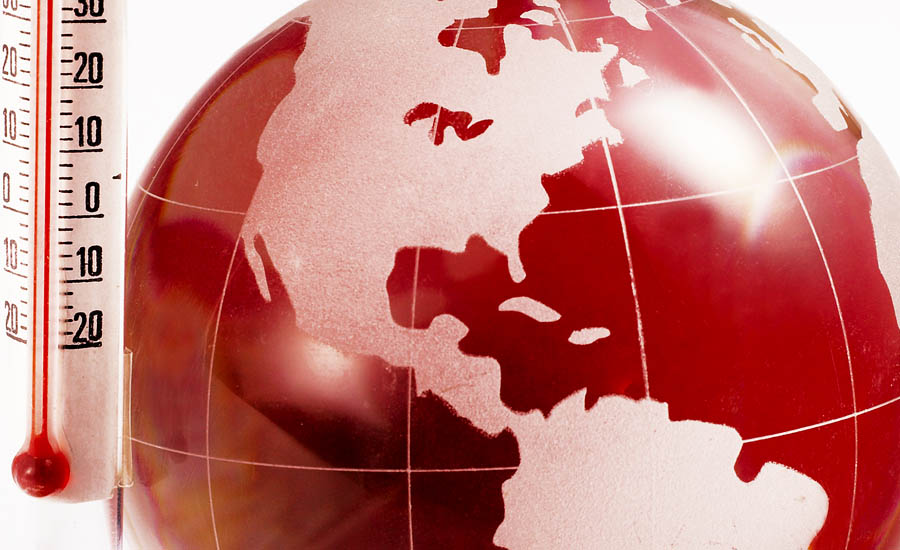WHO:
Health benefits far outweigh the costs of meeting climate change goals

Meeting the goals of the Paris Agreement could save about a million lives a year worldwide by 2050 through reductions in air pollution alone, according to the World Health Organization (WHO). The organization says latest estimates from leading experts also indicate that the value of health gains from climate action would be approximately double the cost of mitigation policies at global level, and the benefit-to-cost ratio is even higher in countries such as China and India.
A WHO report launched recently at the United Nations Climate Change Conference (COP24) in Katowice, Poland highlighted why health considerations are critical to the advancement of climate action and outlines key recommendations for policy makers.
The costs
Exposure to air pollution causes 7 million deaths worldwide every year and costs an estimated US$ 5.11 trillion in welfare losses globally. In the 15 countries that emit the most greenhouse gas emissions, the health impacts of air pollution are estimated to cost more than 4% of their GDP. Actions to meet the Paris goals would cost around 1% of global GDP.
“The Paris Agreement is potentially the strongest health agreement of this century,” said Dr Tedros Adhanom Ghebreyesus, Director-General of WHO. “The evidence is clear that climate change is already having a serious impact on human lives and health. It threatens the basic elements we all need for good health - clean air, safe drinking water, nutritious food supply and safe shelter - and will undermine decades of progress in global health. We can’t afford to delay action any further.”
The same human activities that are destabilizing the Earth’s climate also contribute directly to poor health. The main driver of climate change is fossil fuel combustion which is also a major contributor to air pollution.
"An opportunity, not a cost"
“The true cost of climate change is felt in our hospitals and in our lungs. The health burden of polluting energy sources is now so high, that moving to cleaner and more sustainable choices for energy supply, transport and food systems effectively pays for itself,” says Dr Maria Neira, WHO Director of Public Health, Environmental and Social Determinants of Health. “When health is taken into account, climate change mitigation is an opportunity, not a cost.”
Switching to low-carbon energy sources will not only improve air quality but provide additional opportunities for immediate health benefits. For example, introducing active transport options such as cycling will help increase physical activity that can help prevent diseases like diabetes, cancer and heart disease.
WHO’s COP-24 Special Report: health and climate change provides recommendations for governments on how to maximize the health benefits of tackling climate change and avoid the worst health impacts of this global challenge.
It describes how countries around the world are now taking action to protect lives from the impacts of climate change – but that the scale of support remains woefully inadequate, particularly for the small island developing states, and least developed countries. Only approximately 0.5% of multilateral climate funds dispersed for climate change adaptation have been allocated to health projects.
Pacific Islanders most affected
Pacific Island countries contribute 0.03% of greenhouse gas emissions, but they are among the most profoundly affected by its impacts. For the Pacific Island countries, urgent action to address climate change — including the outcome of COP24 this week — is crucial to the health of their people and their very existence.
“We now have a clear understanding of what needs to be done to protect health from climate change – from more resilient and sustainable healthcare facilities, to improved warning systems for extreme weather and infectious disease outbreaks. But the lack of investment is leaving the most vulnerable behind,” said Dr Joy St John, Assistant Director-General for Climate and Other Determinants of Health.
The report calls for countries to account for health in all cost-benefit analyses of climate change mitigation. It also recommends that countries use fiscal incentives such as carbon pricing and energy subsidies to incentivize sectors to reduce their emissions of greenhouse gases and air pollutants. It further encourages Parties to the United Nations Framework Convention on Climate Change (UNFCCC) to remove existing barriers to supporting climate-resilient health systems.
WHO is working with countries to:
- Assess the health gains that would result from the implementation of the existing Nationally Determined Contributions to the Paris Agreement, and the potential for larger gains from the more ambitious action required to meet the goals of limiting global warming to 2oC or 1.5oC.
- Ensure climate-resilient health systems, especially in the most vulnerable countries such as small island developing states (SIDS); and to promote climate change mitigation actions that maximize immediate and long-term health benefits, under a special initiative on climate change and health in SIDS, launched in partnership with the UNFCCC Secretariat and the Fijian Presidency of COP-23 and operationalized by the Pacific Islands Action Plan on Climate Change and Health.
- Track national progress in protecting health from climate change and gaining the health co-benefits of climate change mitigation measures, through the WHO/UNFCCC Climate and Health country profiles, currently covering 45 countries, with 90 due for completion by the end of 2019.
WHO’s COP24 Special Report: health and climate change
Recommendations
Parties to the UNFCCC could advance climate, health and development objectives by:
- Identifying and promoting actions that both cut carbon emissions and reduce air pollution, and by including specific commitments to cut emissions of Short Climate Pollutants in their National Determined Contributions.
- Ensuring that the commitments to assess and safeguard health in the UNFCCC and Paris Agreement are reflected in the operational mechanisms at national and global levels.
- Removing barriers to investment in health adaptation to climate change, with a focus on climate resilient health systems, and climate smart healthcare facilities.
- Engagement with the health community, civil society and health professionals, to help them to mobilize collectively to promote climate action and health co-benefits.
- Promoting the role of cities and sub-national governments in climate action benefiting health, within the UNFCCC framework.
- Formal monitoring and reporting of the health progress resulting from climate actions to the global climate and health governance processes, and the United Nations Sustainable Development Goals.
- Inclusion of the health implications of mitigation and adaptation measures in economic and fiscal policy.
Source: WHO
Looking for a reprint of this article?
From high-res PDFs to custom plaques, order your copy today!





